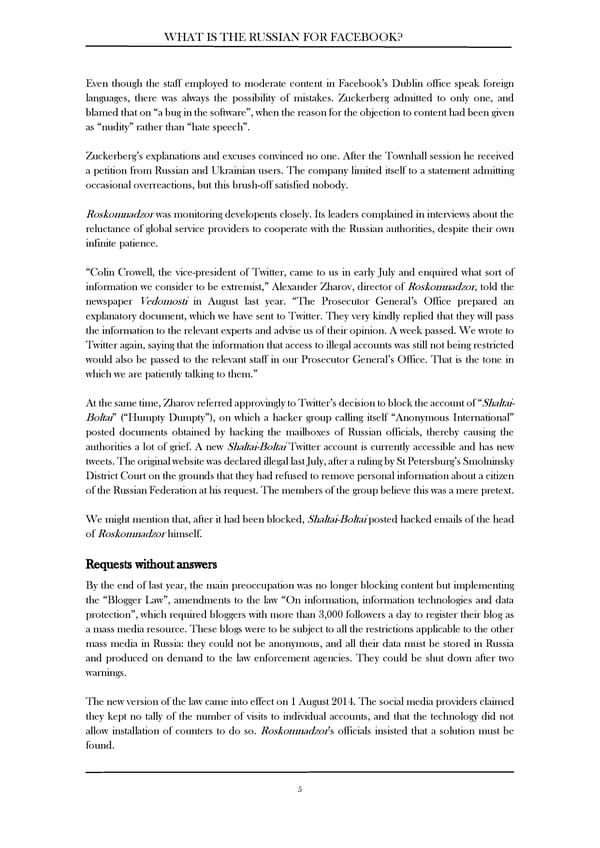WHAT IS THE RUSSIAN FOR FACEBOOK? Even though the staff employed to moderate content in Facebook’s Dublin office speak foreign languages, there was always the possibility of mistakes. Zuckerberg admitted to only one, and blamed that on “a bug in the software”, when the reason for the objection to content had been given as “nudity” rather than “hate speech”. Zuckerberg’s explanations and excuses convinced no one. After the Townhall session he received a petition from Russian and Ukrainian users. The company limited itself to a statement admitting occasional overreactions, but this brush-off satisfied nobody. Roskomnadzor was monitoring developents closely. Its leaders complained in interviews about the reluctance of global service providers to cooperate with the Russian authorities, despite their own infinite patience. “Colin Crowell, the vice-president of Twitter, came to us in early July and enquired what sort of information we consider to be extremist,” Alexander Zharov, director of Roskomnadzor, told the newspaper Vedomosti in August last year. “The Prosecutor General’s Office prepared an explanatory document, which we have sent to Twitter. They very kindly replied that they will pass the information to the relevant experts and advise us of their opinion. A week passed. We wrote to Twitter again, saying that the information that access to illegal accounts was still not being restricted would also be passed to the relevant staff in our Prosecutor General’s Office. That is the tone in which we are patiently talking to them.” At the same time, Zharov referred approvingly to Twitter’s decision to block the account of “Shaltai- Boltai” (“Humpty Dumpty”), on which a hacker group calling itself “Anonymous International” posted documents obtained by hacking the mailboxes of Russian officials, thereby causing the authorities a lot of grief. A new Shaltai-Boltai Twitter account is currently accessible and has new tweets. The original website was declared illegal last July, after a ruling by St Petersburg’s Smolninsky District Court on the grounds that they had refused to remove personal information about a citizen of the Russian Federation at his request. The members of the group believe this was a mere pretext. We might mention that, after it had been blocked, Shaltai-Boltai posted hacked emails of the head of Roskomnadzor himself. Requests without answers By the end of last year, the main preoccupation was no longer blocking content but implementing the “Blogger Law”, amendments to the law “On information, information technologies and data protection”, which required bloggers with more than 3,000 followers a day to register their blog as a mass media resource. These blogs were to be subject to all the restrictions applicable to the other mass media in Russia: they could not be anonymous, and all their data must be stored in Russia and produced on demand to the law enforcement agencies. They could be shut down after two warnings. The new version of the law came into effect on 1 August 2014. The social media providers claimed they kept no tally of the number of visits to individual accounts, and that the technology did not allow installation of counters to do so. Roskomnadzor’s officials insisted that a solution must be found. 5
 What is the Russian for Facebook? Page 5 Page 7
What is the Russian for Facebook? Page 5 Page 7